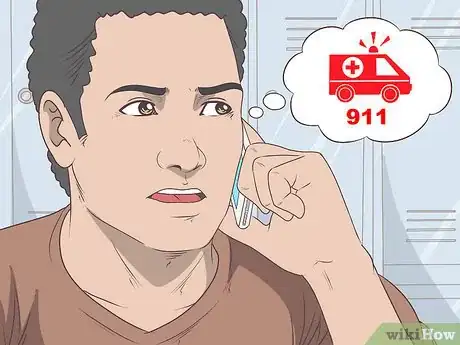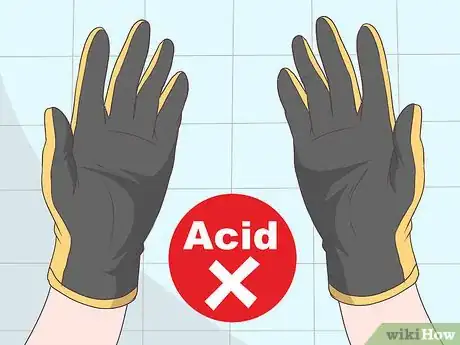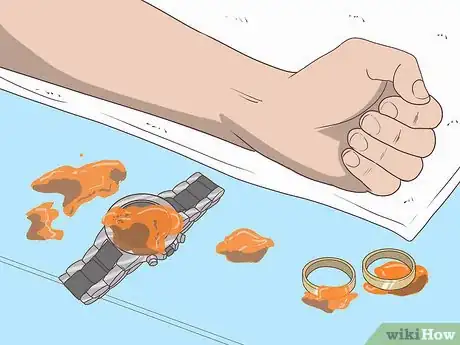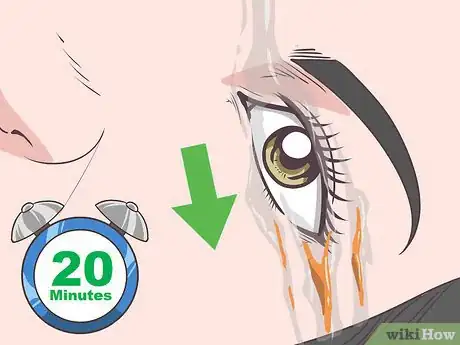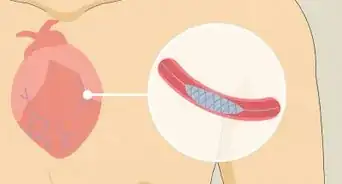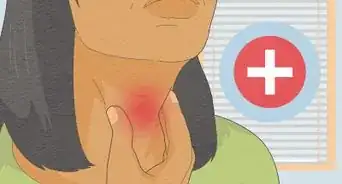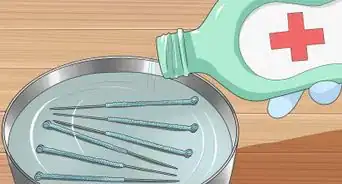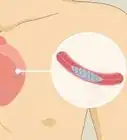This article was medically reviewed by Sarah Gehrke, RN, MS. Sarah Gehrke is a Registered Nurse and Licensed Massage Therapist in Texas. Sarah has over 10 years of experience teaching and practicing phlebotomy and intravenous (IV) therapy using physical, psychological, and emotional support. She received her Massage Therapist License from the Amarillo Massage Therapy Institute in 2008 and a M.S. in Nursing from the University of Phoenix in 2013.
This article has been viewed 48,699 times.
When someone throws powered or liquid acid on to someone else, it’s critical to act fast to help the victim. Reach out to emergency professionals right away by calling emergency services. If it’s safe for you to approach the victim, neutralize the acid by pouring water over it. Help the victim by removing any of their clothes that are contaminated with acid. Then, wait for emergency help to arrive.
Steps
Rendering Immediate Assistance
-
1Call 911 or emergency services immediately. While you can provide some assistance to the victim, it’s critical to get professionals on the scene as soon as possible. Use your own phone to make the call and put it on speaker. Or, ask another person to make the call and relay the information to the dispatcher.
- For example, when speaking to emergency services you might say, “I’ve just witnessed an acid attack on a female victim.”
-
2Sit the victim down on the ground. If the victim is still standing post-attack, it is likely that they will be disoriented and in a great deal of pain. To prevent a possible head injury, help them into a sitting or lying down position. If you notice a water source nearby, such as a fountain, help them in that direction before sitting them down.
- Before you actually have the victim sit down, check to make sure the area is safe and free of other hazards. If you need to have the victim move slightly, guide them verbally.
- Try keep bystanders away from the area to prevent injury to others.
Advertisement -
3Put on gloves or cover your hands with fabric. If you happen to have a pair of gloves on you, then put them on right away. Otherwise, remove your shirt or find another piece of fabric to wrap around your hands multiple times. This will protect your hands from coming into contact with the acid as you render assistance to the victim.[1]
- If you don’t cover your hands, then you’ll have to be extremely careful touching the victim. The acid can transfer to your skin and burn you.
-
4Brush away any powdered acid from clothing or skin. If you can see powdered acid on the victim, then you’ll need to remove it to minimize burning. With your hands fully covered, make sharp downward brushing movements on the person’s clothing and skin. Stand as far back as you can while doing this and avoid breathing in any of the powder.[2]
-
5Remove any contaminated clothing. As long as the acid stays on clothing, it will continue to burn through and could reach the skin. Carefully take off or cut away any fabric that has been touched by the acid. Place the clothing far away from the victim and caution other people to leave it alone.
- Be careful not to spread the acid from the clothing to other parts of the skin. This is why it may be best to cut or tear away the clothing in some cases.
- If the clothing is stuck to the victim’s skin, then don’t try to remove it or you could rip their skin. Instead, keep it completely saturated with clean water.
-
6Take off any contaminated jewelry. Remove any rings, necklaces, or bracelets that might have come into contact with the acid. Even the smallest jewelry item could continue to damage the skin if it has acid on it. These pieces will be okay to wear again after they’ve been fully rinsed off with saline or water.[3]
Rinsing the Victim with Clean Water
-
1Flush the injured area with water. Get a water hose, open tap, or shower and soak the victim with fresh, clean water. Continue to pour water on the areas with acid for 20 minutes at least. Rotate the stream of water, so that the acid is pushed away from the victim’s body and onto the ground.
- The water must be clean or you risk causing an infection within the forming burns.
- If you only have a water bottle, go ahead and use it on the wounds. However, yell out to others for more water or move the victim closer to a water source.
-
2Rinse out an affected eye by holding it under running water. If acid gets into the eye, it can burn through the cornea and cause blindness. If you suspect that the victim’s eye has acid on it, have them bend their head downwards. Pour a stream of clean water over the eye for 20 minutes or as long as possible.[4]
- If you can, gently open the victim’s eyelid, so that the water actually reaches the eye itself. Otherwise, the acid can stay hidden under the lid and continue to burn.
- Avoid touching the eye itself, as you could contaminate the burn.
-
3Move the victim away from the flushed water. If the person is lying or sitting on the ground, don’t let them lie in a pool of water after rinsing them off. You may need to move them a few times during the rinsing process. If they can stand with assistance at the water’s source, such as a shower, then that is even better.
Providing Ongoing Care
-
1Monitor the victim’s vital signs. Watch to make sure that the victim is still breathing regularly. Instruct them to take deep, continual breaths. This will help to prevent hyperventilation. Keep talking to the victim to gauge their response levels. If they become disoriented, report this information to the emergency operators.
- If the victim stops breathing, you’ll likely need to perform CPR. The emergency services operator can guide you through this process until the paramedics arrive.
-
2Wait for the arrival of paramedics. As soon as you call emergency services, an ambulance will be dispatched to your location. If you move the victim, make sure to keep the operator updated regarding your whereabouts. When you see the ambulance, flag them down with your hands. Back away from the person, so that they can treat them.
-
3Take the victim to the nearest hospital if you cannot reach emergency services. Time is critical when treating burns, so you’ll need to act fast if you can’t get emergency help. Bring the victim to a hospital’s emergency entrance. They will likely be admitted immediately into a protected burn ward area.[5]
-
4Expect a long healing process. For victims of an acid attack, the recovery process can take months or even years. The immediate burns will be treated, but the victim may also need to undergo physical therapy or reconstructive surgery. The key is to view it as a marathon, not a sprint, back to health.[6]
-
5Seek out support groups for burn victims. If you are treating an acid attack victim, it’s important to care for their emotional and mental well-being as well. Look for a burn support group in the area that meets regularly. There are also online burn groups that can offer some support.[7]
- If you are a witness to an attack or a caregiver for a victim, you may also need to seek out a support group.
Warnings
- Don’t put any lotion or cream on to the injured areas. This will only make it more difficult for emergency professionals and doctors to treat the wounds.⧼thumbs_response⧽
- Unless you have specialized training in treating this kind of trauma, don't try to neutralize the acid with anything other than water.[8]⧼thumbs_response⧽
References
- ↑ https://www.mayoclinic.org/first-aid/first-aid-chemical-burns/basics/art-20056667
- ↑ https://www.nhs.uk/conditions/acid-and-chemical-burns/
- ↑ https://www.express.co.uk/life-style/life/836522/Acid-attack-what-to-do
- ↑ https://www.nhs.uk/conditions/acid-and-chemical-burns/
- ↑ https://www.express.co.uk/life-style/life/836522/Acid-attack-what-to-do
- ↑ https://www.nhs.uk/conditions/acid-and-chemical-burns/
- ↑ https://www.nhs.uk/conditions/acid-and-chemical-burns/
- ↑ https://www.sja.org.uk/sja/what-we-do/latest-news/first-aid-for-acid-attacks.aspx
